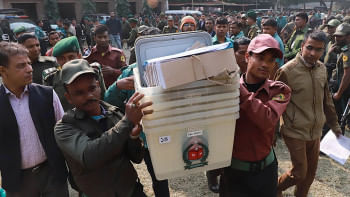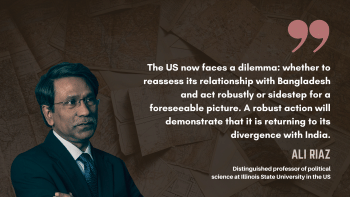A country drifting into political paralysis

For a Bangladeshi who loves and treasures their motherland, Ali Riaz's Pathways of Autocratization: The Tumultuous Journey of Bangladeshi Politics (Routledge, 2024) is a difficult read. It is so not because of any weakness in the presentation of the text or its arguments. Nor because of any contradiction in the content of the material investigated. What makes the book a heavy read is the fact that the writer leads the reader to the realisation that Bangladesh's regression into an authoritarian and autocratic regime, with associated atrocities, was foreseen and precipitated by actors inside and outside the country.
The Bangladesh where I grew up promised much hope despite a myriad of challenges and constraints. But Ali Riaz sadly observes that the country is fast drifting into a political paralysis and descending into the abyss of authoritarianism, while maintaining a democratic facade. All these add up to a quagmire of corruption, injustice, repression, lawlessness, unrest, violation of human rights, and other abuses of power.
Pathways of Autocratization presents its author as a keen observer of Bangladeshi society and politics. His research interest in, and interpretation of, the political happenings in the country deserve careful reading and thoughtful consideration for the following reasons in particular.
First, Riaz is one of those writers and commentators who talks about Bangladesh from the depths of double consciousness and multiple experiential dimensions. He is a Bangladeshi who grew up, trained, and taught in Bangladesh. He then went abroad for higher education and has worked as a journalist and academic, focusing on Bangladesh's society and politics.
Second, though currently a distinguished professor in the Department of Politics and Government at Illinois State University in the US, Riaz is a frequent traveller to his country of birth. Hence, he has the ability to look at Bangladesh from both within and without. Such an inside-outside perspective makes his views about Bangladesh distinct in an interconnected world.
Third, Ali Riaz writes both in Bangla and English, and thus warrants the attention of readers in Bangladesh and beyond its borders. While he publishes with international presses like Palgrave and Routledge, his Bangla and English works are also printed by Dhaka-based publishers. Moreover, he appears in Bangladeshi and international media more often than most other Bangladeshi academics.
All these factors make Riaz a Bangladeshi writer who has been able to reach a very wide domestic and overseas audience. Ali Riaz's prolificity, marked by bilingualism and an intense focus on Bangladesh, is a testament to his scholarly rigour and tenacity as well as to his desire to give back to his country, intellectually and optimally. Pathways of Autocratization is a success on account of two important hallmarks of academic research: it is well-structured and cumulative.
The organisation of ideas in Pathways of Autocratization follows a logical sequence. Ali Riaz uses the Introduction to foreground the book's basic premise and appeals to readers' conscience by stating that the discussion concerns the world's eighth most populous country. Even if Bangladesh is not known as an important global actor, its political order affects a very large population inside the country as well as in the diaspora.
As a writer and editor myself, I can say with certainty that the long list of references in each section of the book enhances its cumulative merit manifold. Most of the sources Ali Riaz references in the book are very recent, dated 2018 and later. He even cites from one of his forthcoming works—How Autocrats Rise: Sequences of Democratic Backsliding (Palgrave Macmillan, 2024). Riaz's other books which he cites in Pathways of Autocratization include: Voting in a Hybrid Regime: Explaining the 2018 Bangladeshi Election (Palgrave Macmillan, 2019), Religion and Politics in South Asia (Routledge, 2021), and More Than Meets the Eye: Essays on Bangladeshi Politics (UPL, 2022). Given these works were produced in such quick succession, Ali Riaz stands out for his prolific contributions as a writer on Bangladesh.
In Chapter 1 of Pathways of Autocratization, the author attempts an overview of the global state of democracy and autocracy, and how certain countries vacillate between these two contrary political phenomena. In the subsequent discussion, he zooms his gaze in on the going-ons of Bangladesh and provides a "probing analysis of events and trends in Bangladeshi politics" (p. i), as well as an account of the debilitation of the country's democratic norms and institutions, especially since 2009. Presenting data and drawing conclusions from various studies and research sources, Ali Riaz comments on the overlap between democracy and authoritarianism and on certain kinds of state repression from a global perspective.
A landmark year that witnessed the precipitation of democratic crises in Bangladesh was 2011 when, through a constitutional amendment, the government abolished the caretaker government provision and "opened the door for unchecked electoral fraud" (p. 33). Accordingly, Ali Riaz states, "the autocratization process [in Bangladesh] began in 2011" (p. 31) and the "persecution of the opposition began concurrent with the changes in the constitution" (p. 35).
We should make no mistake regarding the fact that those in the opposition are citizens of Bangladesh, and their persecution enhances the feeling of vulnerability for the entire population. As Riaz puts it: "Punishment of individuals sends a clear message to media institutions, journalists, and private citizens where the line must be drawn" (pp. 40-41). He elaborates on oppression at a macro level; but says that its domino effect throughout the country, especially in remote and rural areas, is underreported and under-discussed.
A constant refrain in Pathways of Autocratization is that autocratic and antidemocratic leaders use the democratic ladder to ascend to power only to kick that ladder aside, so that their political rivals cannot replace them via the same path. This theory is pertinent to understanding the behaviour of the party in power in Bangladesh. It used the democratic means of the 2008 general election only to remove the ladder after its ascent to power.
Perhaps the foreign supporters of the regime also do not want the ladder restored, as they prefer fishing in the stagnant, muddy waters of Bangladeshi politics. According to Ali Riaz, foreign powers generally support autocratic regimes in two ways: "the demonstration effect" of "the emergence and survival of a new autocratic regime sends a message and creates an unwritten playbook that is then followed by the aspiring autocrats;" and through the creation of "a supportive nexus" (p. 17). In the case of Bangladesh, both seem to have played their roles in destroying democratic values and institutions in the country.
In regard to foreign complicity in an undemocratic government remaining in power in Bangladesh, Ali Riaz rounds off his argument by pointing to tripartite powers: "India's interjection and China's facilitatory role accelerated the autocratization process while Western countries remained silent" (p. 78).
The list of dividends for India is perhaps the longest. Ali Riaz mentions a few: transit through Bangladesh, access to Bangladeshi ports, selling electricity to Bangladesh "at the highest price," installing "a surveillance system in the Bay of Bengal," control over the River Kushiyara, favourable trade gaps (p. 65), increased foreign remittance from Bangladesh, and using the country as a market for its products (p. 85).
I want to conclude with an anecdote. Concerned Bangladeshis often rant and ramble about how the country is being run. Many vent frustrations over the lack of democracy and political freedom in their country. Baffled and desperate for solutions, a friend of mine once said: "We need more Ali Riazes."
This statement has remained imprinted on my mind. A densely populated country, Bangladesh has produced many scholars—living in Bangladesh and the diaspora—who are morally obligated to speak up when things go wrong in the country. Not many of them are carrying out this moral duty.
In his book, Ali Riaz talks about "consolidated democracies." Does a democracy become consolidated only by the goodwill of its politicians? Can a corrupt government in a country like Britain deny its citizens their democratic rights? The answer in both cases is "no." Consolidated democracies have committed scholars who represent civil society and intellectual voices. They constitute the foundation upon which the democracy of the nation rests.
Autocrats in Bangladesh have succeeded repeatedly in eroding democratic values and threatening civic life, partly because of the absence (or rather silence) of a strong intellectual base in the country. Unfortunately, many of those who were supposed to represent the conscience of the nation are serving as "willing executioners" (p. 49) and doing the bidding of the regime.
Md Mahmudul Hasan, PhD is professor in the Department of English Language and Literature at International Islamic University Malaysia.
Views expressed in the article are the author's own.
Follow The Daily Star Opinion on Facebook for the latest opinions, commentaries and analyses by experts and professionals. To contribute your article or letter to The Daily Star Opinion, see our guidelines for submission.

 For all latest news, follow The Daily Star's Google News channel.
For all latest news, follow The Daily Star's Google News channel. 












Comments